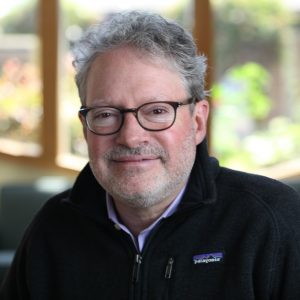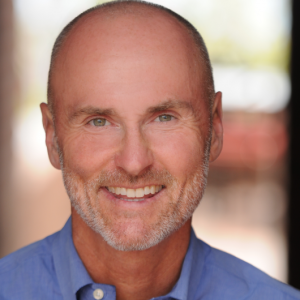To the (Longevity) Revolution!
5 Questions with Marc Freedman

Social entrepreneur. Longevity expert. Visiting scholar. Author of five books.
All of these titles describe Marc Freedman, President and CEO of the standout nonprofit Encore.org, which fosters and celebrates intergenerational impact. To that, ALEX.fyi would simply add that Marc is someone with a lot to say about purpose, connectedness and the real meaning of living forever.
If you are in the “second act” stage of your life, he and Encore.org may be just the inspiration that you need. Marc recently returned from the 2019 Aspen Ideas Festival, where he was a featured speaker. He was kind enough to answer so many of our questions that it was hard to limit ourselves to just five answers. Here is our 5 plus interview with Marc.
ALEX.fyi:
You just got back from the Aspen Ideas Festival where you discussed the richness and meaning that intergenerational proximity can bring. You spoke movingly about the joy that foster grandparents brought to the pediatric ward. What do you tell an older person who is apprehensive about trying to forge intergenerational contact in a culture that can be fixated on youth?
MF:
I understand the apprehension, but it may be based on the assumption- often faulty- that young people don’t want older people around. According to a recent survey, 90 percent of US workers prefer multigenerational workplaces, and 87 percent say it’s because working with a variety of ages “increases innovation and problem-solving.” Outside of the workplace, we’re seeing more innovative, multigenerational housing solutions- like Nesterly and Silvernest. And more nonprofits- like Oasis, Experience Corps, Reading Partners, and Strive for College- are actively recruiting older adults to work with children and youth who need more caring adults in their lives. My three sons are lucky to have Jake and Joyce, two neighbors in their eighties who love to spend time with them. So, if you want more intergenerational connection in your life, here are three quick tips: reach out to a youth-serving nonprofit, listen more than you talk, and persist until you find the right match.
ALEX.fyi:
You’ve often said that all that a young person needs to succeed is to have one older person who is irrationally crazy about them. Is that the seed of the idea behind the Gen2Gen campaign?
MF:
I often quote the famous child psychologist Urie Bronfenbrenner, who said, “Every child needs at least one adult who is irrationally crazy about him or her.” Yes, that’s a big part of the idea behind Gen2Gen, Encore.org’s campaign to mobilize adults 50+ to help kids thrive- and to work side by side with young people for change. We’re bringing the generations together to improve life for all, help youth-serving organizations tap experienced talent, and tell a new story about the benefits of living Gen2Gen. You can find out more and sign up for updates at iamgen2gen.org.
ALEX.fyi:
You are the author of five books, most recently How to Live Forever: The Enduring Power of Connecting the Generations. One consistent theme that I’ve noticed running through your written work is the idea of searching for a new roadmap for life now that we have increased longevity in our favor. What has been the most surprising reaction that you’ve gotten to your latest book?
MF:
I get a lot of surprised reactions to the title! I’m actually appalled by the Silicon Valley tech titans who are investing billions in plans to radically extend life, even eliminate death entirely. The only true way to endure is to accept our mortality and with it the wisdom that we are a species designed to live on… just not literally. We do so by passing on, from generation to generation, what we’ve learned from life. By investing in and connecting with the next generation, not actually trying to be that generation. That’s how we live forever.
ALEX.fyi:
In your 2011 book, The Big Shift: Navigating the New Stage Beyond Midlife, you recounted the story of booking a hotel room with your AARP card (you were 50 at the time) and then calling back to request that they add two cribs to the room for your infant children. Confusion ensued. How do you feel like the culture has shifted since then in the perception of what it means to be an older parent?
MF:
My wife Leslie and I have three sons, ages 9, 11 and 13. We got a very late start- sometimes I think we had our own grandchildren. I think my corner of the world (the Bay Area) is a bit more accepting of older parents (and families of all kinds). I’m glad that, as an older parent, I’ve got more empathy and patience and a few more problem-solving skills. But we have a long way to go in rethinking the way we compartmentalize life. Education, then work and kids, then retirement- it just doesn’t work anymore. We may have 50- or 60-year careers, so why cram all our formal education in the first two decades? And who can afford to plan on 30 or 40 years without an income?
ALEX.fyi:
You spearheaded the creation of the enormously popular Purpose Prize, an annual $100,000 prize for social entrepreneurs in the second half of life. (The Prize is currently run by the AARP.) Since 2005, it has produced over 500 winners and fellows. There are countless inspirational stories to choose from, but is there one winner whose story has especially stuck with you over the years?
MF:
It is really hard to choose just one! I still talk about Gary Maxworthy, who used his expertise in the food business to revolutionize the distribution of fresh produce to food banks throughout California. And Wilson Goode, who was the first African-American mayor of Philadelphia before he got his doctorate from divinity school and started a nonprofit to provide mentors for children of incarcerated parents. And Judy Cockerton, who was a foster parent to two sisters but wanted to do more. She established Treehouse, a planned community where foster families live next door to older adults who help out as surrogate grandparents. I could go on and on, but suffice it to say that the Purpose Prize proved beyond a doubt that we can do our best, most creative work in our later years.
ALEX.fyi:
In 2018, you and your organization were awarded the Eisner Prize for Intergenerational Excellence. How has the Prize helped you extend your already considerable impact on the communities that you serve?
MF:
We’re very proud of the Eisner Prize and our association with the Eisner Foundation, the first American foundation to fully dedicate itself to bringing the generations together for mutual benefit. In fact, we’re now partnering with Eisner and several other foundations to find innovative ways to increase the investment in intergenerational solutions. Right now, a mere 1% of philanthropy goes into anything related to aging, and a tiny fraction of that goes into productive opportunities for engagement across the generations. We hope to change that.
ALEX.fyi:
Your organization has supported such inspired intergenerational mash-ups as Nuns and Nones, a program that temporarily bunks nonreligious Millennials with nuns. What is one of your favorite “crazy like a fox” intergenerational pairings?
MF:
I’m really excited about the innovations in intergenerational housing. Right now, we’re working with Silvernest, a home-sharing platform, to broker partnerships with AmeriCorps programs so older people willing to rent an extra room in their homes can provide affordable housing to idealistic young people who are doing a year of national service with organizations like Teach For America in Denver and San Francisco and City Year in Miami. These partnerships can make national service more affordable for more young adults and chip away at big problems, like the shortage of affordable housing, the need many older people have for income and companionship, and the persistent divides of race, income, and age that keep us from getting to know one another. If you have room to spare, sign up with Silvernest today!




